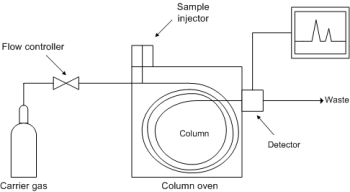The gas chromatography is special type of chromatography, where the mobile phase is gas, such as helium or nitrogen. The stationary phase is usually solid support covered with liquid layer.
After the sample injection the mobile phase carries the sample compounds through the column. Usually, the temperature gradient is applied and compounds are then separated according theirs boiling points.
Gas chromatography instrumentation
 The figure shows typical scheme of gas chromatograph. The gas (mobile phase) flows through the column placed in the oven with controlled temperature. After the separation is finished the individual compounds elute from the column and specific detector registers signal.
The figure shows typical scheme of gas chromatograph. The gas (mobile phase) flows through the column placed in the oven with controlled temperature. After the separation is finished the individual compounds elute from the column and specific detector registers signal.
Applications
Gas chromatography is very useful for the analysis of small volatile compounds with boiling points lower than 300 °C. Gas chromatography is applied in chemistry industry (especially petrochemistry) to control the quality chemical products. GC can be also used for analysis of toxic compounds, environmental analysis and so on.